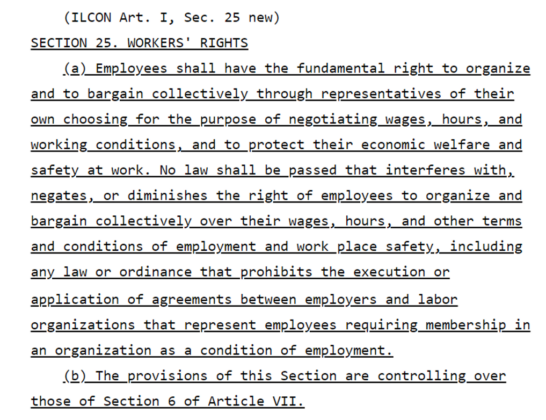Editor's note: This article was originally published at Wirepoints.org.
Most Illinoisans are unaware, but their General Assembly is poised to pass a resolution for a state constitutional amendment, the consequences of which are hard to overstate. It would vastly expand union power, permanently, particularly public union power that is already extreme.
Limited media coverage so far characterizes the amendment mostly as an attempt to permanently ban right-to-work and lock in current worker protections. That would be bad enough, since the majority of states are now right to work including nearby competitors Wisconsin, Michigan, Indiana and Iowa. And Illinois is already an outlier in how much power it has given to public unions, particularly in collective bargaining rules.

But that’s just the start. Think hard about what the short amendment, shown here, would do.
Read it and consider the following:
The first sentence, by itself, creates a new, personal constitutional right. That right would take all covered matters described in that sentence out of the hands of the legislature and local governments, subjecting it all, instead, to collective bargaining.
Both the scope of that right and the rules for how the collective bargaining would be conducted are sweeping and open-ended. Note in particular that all matters of “economic welfare” would be forced into collective bargaining, and those matters of economic welfare apparently need not be tied to the workplace (though that’s not entirely clear).
What isn’t a matter of “economic welfare”? Practically nothing. The Chicago Teachers Union has attempted in the past to include matters like affordable housing in its bargaining. Under the amendment it would clearly have a strong case for demanding any number of such policies as part of its contract negotiations. Same for any other union.
The broad, new right would override extensive law already in place. Today, public union negotiation is covered by the lengthy Illinois Public Labor Relations Act and the Illinois Education Labor Relations Act. Private unions are governed by both federal and state law.
But constitutional rights trump all state law, so claims based solely on the new amendment would be asserted. Public unions would have a field day in Illinois courts. The amendment would throw everything open to a new standard that only the courts would define, and we know that Illinois’ political courts routinely rule as unions want.
The second sentence is irrational surplus on its face. Since a constitutional right is already created by the first sentence, why bother saying that “no law shall be passed” that contradicts the things for which a constitutional right is already created in the first sentence? Note also that there’s no reference to existing rights, so this is not about locking in current law. The key is that first sentence, which creates something entirely new.
One example of how the amendment would work is pension reform. Suppose the legislature some day goes back to the courts to try again claiming the facts have changed (as they already have) since the courts last ruled against reform. Or perhaps the composition of the Illinois Supreme Court changes in favor of reformers. As before, the legislature would then pass a reform bill that the unions wouldn’t like. But the unions, under the amendment, would answer that reforms could only be made through collective bargaining. It wouldn’t be a matter legislation could change. The amendment would thereby create an additional bar to pension reform, just as it would to any other change in labor law.
Trial lawyers, too, would have a field day with the amendment. Because the proposed amendment is so open-ended and horribly worded, the claims they might assert would be limited only by their imagination.
I have focused so far on the proposed amendment’s impact on public unions for two reasons.
First, let’s just stipulate that much of Illinois’ problems derives from their excessive influence over Illinois government, because every informed Illinoisan knows that.
Second, the powers behind the proposal have basically admitted that it’s intended to benefit public unions. Sen. Ram Villivalam (D-Chicago) is lead sponsor of the measure in the Senate.
As reported by Capitol News Illinois, Villivalam said it would have minimal impact on private-sector workers because the National Labor Relations Act governs organizing and collective bargaining in the private sector. He said the intent was to protect the right to collective bargaining that is already established under the Illinois Public Labor Relations Act and the Illinois Education Labor Relations Act, and those are for public unions.
Villivalam’s admission is probably right, but he’s wrong to disregard the impact the amendment might also have on private sector labor.
One lawyer we heard from on that is Jeff Risch, who chairs the labor and employment group at the SmithAmundsen law firm. He primarily represents small and mid-size employers that occasionally are able to voluntarily reach agreements to remain union-free. The amendment would apparently make that impossible, he said, by giving any employee a constitutional right to bargain collectively. For that and other reasons, “This amendment will seal Illinois’ fate forever,” he says.
Also, much of private sector collective bargaining is controlled by federal law. Insofar as the amendment purports to override it, complex questions of preemption would have to be litigated, which is another mess the amendment would create.
To summarize, drafters of the proposal have made it deliberately and deceptively ambiguous and misleading, but also radically broad and open-ended. By creating a new constitutional right for themselves and their agenda they would be throwing a cluster bomb toward everything in their way. The amendment’s full impact may not be entirely certain but it would, for sure, clear a path to new, unimagined public union power.
